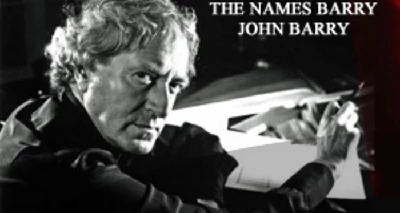John Barry
-
1933-2011: The Name's Barry-John Barry
published: 21 /
2 /
2011

Spencer Robertshaw looks back on the life of film soundtrack and James Bond composer, John Barry, who died at the age of 77 in Januray
Article
I do not intend to write a historical reference to all of John Barry's work as it would become another entry in Wikibollocks or whatever they call it, but to give a flavour and insight instead into our most influential son of York, a true musical master who sadly has gone on to double O heaven at the age of 77 after suffering a heart attack on the 30th January. This piece is a taster which might hopefully lead you to other things.
John Barry was influenced by films and theatre from a a young age. His father owned eight cinemas and would regulary take Barry along with him. Barry soon learnt that the music in a film can often be as or more important than the film itself and lends it to a vast array of interpretation and colour.
A who's who of cinematic excellence made up Barry's work, but he also had an influence on television with his theme to the early 1970's Roger Moore/Tony Curtis TV series, 'The Persuaders', to mention just one. He had an uncanny way of putting himself into the frame as the subject for the music and this led to a very organic growth of his scores.
As Geoff Leonard, the unofficial but proper expert on John Barry, has described it: "What I admired most about John Barry was his ability to score such a wide variety of films. Perhaps best-known for James Bond, he was equally at home on multi-million dollar epics or smaller scale films. He gave them all an equal amount of loving care and attention. His method of looking at a film from the point of view of the character always stood him in very good stead."
Barry's soundtracks included films as diverse as 'Zulu' (1964), 'Born Free' (1966) and 'Out of Africa'(1985). He introduced blues and jazz themes into 'The Chase' (1966) and 'The Cotton Club' (1984) and conceived the shivery, sinister music for the Harry Palmer spy thriller 'The Ipcress File' (1965) lending Michael Caine a firm support with its harrowing refrains and haunting melody.
Barry did truly have ‘The Midas Touch’ and with it he changed the face and sound of film forever. Modern bands still sample Barry’s work and he is a big influence on many aspects of music today, be it Robbie Williams or the Wu-Tang Clan. Can you imagine that in April 1964, however, a concert, however, scheduled for the Bristol Colston Hall wtih Shirley Bassey, Matt Monro and Barry, was cancelled due to poor ticket sales?
Barry will be best remembered for his contribution and perhaps birthing of the James Bond soundtracks. He did eleven complete soundtracks and provided fantastic accompaniments to singers such as Shirley Bassey, Nancy Sinatra, Tom Jones and Matt Monro.
There is lot of confusion as to who scored the original James Bond tune and controversy that the original was written by Monty Norman with Barry just doing the arrangement for a flat fee. If this was the case then it shows that Barry could take a flat piece of music (as was thought of the Norman piece by EON Productions) and turn it into a dynamic, sexy, unforgetable masterpiece. 'The Bond Theme Tune' will always seem to the purist Barry and Bond fan as the essence of 007, matching Sean Connery’s unbeatable acting turn for turn with Vic Flic's cool and dirty guitar riff.
There have been court cases and much discussion regarding who was responsible for the Bond tune. Reading between the lines, however, it seems that Norman had the first sketchy idea which was then placed in Barry's hands. The tune itself includes reference points to an earlier piece of Barry’s from 1958 called 'Bee's Knees' which was written several years before the 007 theme was indeed concieved.
Barry had a very brave sense of humour and confidence. He once put a sack over Sophia Loren’s head when she sang because she wasn’t confident enough and she thought she pulled funny faces. He also famously stood up to diva, Barbara Streisand, telling her where he drew the line.
He was appalled by the attitude of pop band A-ha when they recorded their song for the 1987 Bond film, ‘The Living Daylights’. They refused to watch the film beforehand which was Barry’s way of getting the right "vibe" for recording. It really annoyed him as in the past even Louis Armstrong had come out of hospital to watch 1969's 'On Her Majesty's Secret Service' before he sang ‘We Have All The Time in The World’. This was in fact one of the last songs Armstrong recorded before he passed away.
His death is a great loss to film, theatre and television but just like all the greats John Barry will keep influencing the arts forever through his work, which is always the ultimate benchmark.
John Barry RIP.